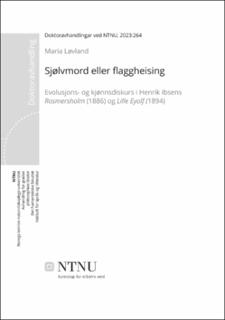| dc.description.abstract | Samandrag
Avhandlinga Sjølvmord eller flaggheising. Evolusjons- og kjønnsdiskurs i Henrik Ibsens «Rosmersholm» (1886) og «Lille Eyolf» (1894) tar føre seg 1800-talets vitskaps- og evolusjonsdiskurs i Henrik Ibsens forfattarskap, både i skjønnlitterære tekstar og i forarbeid, notat, brev og talar, og særleg i skodespela Rosmersholm og Lille Eyolf. Avhandlinga er todelt; første delen skildrar 1800-talets evolusjonsdiskurs og forholdet mellom vitskap og litteratur med hovudvekt på Skandinavia, og tar i tillegg føre seg tidlegare forsking som har relatert Ibsen til evolusjonismen. Del to inneheld nylesingar og kontekstuelle analysar av Rosmersholm og Lille Eyolf som viser at skodespela inngår i den darwinistiske samtidsdiskursen. I forkant av verkanalysane kjem ein gjennomgang av skodespelas resepsjonshistorie.
Avhandlinga viser at evolusjonsdiskursen pregar Ibsens forfattarskap i større grad enn det som har vore kartlagt tidlegare. Særleg gjeld dette synet på evolusjonen som kjønnsspesifikk. Det viktigaste funnet, og det som etter kvart utkrystalliserer seg som hovudpoenget i avhandlinga, er at kjønnsførestillingane i desse tekstane ikkje ser ut til å avvika frå dei evolusjonistisk forklarte biologiske og essensialistiske kjønnsoppfatningane som karakteriserer vitskapsdiskursen i Ibsens samtid. Ein kan finna dei igjen i Ibsens eigne ytringar, og dei pregar òg førestillingane om kjønn som konstituerer hovudpersonane og parkonstellasjonane i Rosmersholm og Lille Eyolf. Når ein tar omsyn til det, blir det lettare å forstå utviklinga til karakterane og handlinga, og korfor skodespela endar som dei gjer: Korfor Rebekka West og Johannes Rosmer gjer sjølvmord, medan Rita og Alfred Allmers heiser flaget i takksemd og håp.
Avhandlingas kontekstualiserande perspektiv avdekker eit markant spenningsforhold mellom Ibsens hyppige bruk av evolusjonsdiskursen og kjønnssynet knytt til denne, og den etablerte førestillinga om Ibsen som ein av attenhundretalslitteraturens viktigaste feministar. Analysane står i skarp kontrast til tidlegare lesingar som oppfattar dei kvinnelege hovudkarakterane som utradisjonelt frigjorte og sjølvstendige, og som tar til orde for at dei er framstilt som ein slags feministiske heltinner. Ved å lesa Ibsen opp mot den evolusjonistiske konteksten kastar avhandlinga lys over element som resepsjonen til nå ikkje har lagt vekt på, og ho tilbyr dermed nylesingar av to av Ibsens skodespel som av mange har blitt oppfatta som vanskelege, og, av somme, som mindre vellukka.
Summary
The dissertation Suicide or flag raising. Evolution and gender discourse in Henrik Ibsen's "Rosmersholm" (1886) and "Little Eyolf" (1894) focus on the 19th-century science and evolution discourse in Henrik Ibsen's writing, both in his fictional texts and in the preparatory work, notes, letters and speeches, and especially in the two dramas Rosmersholm and Little Eyolf. The dissertation has two main parts; the first depicts the 19th-century discourse on evolution and the relationship between science and literature with an emphasis on Scandinavia, and also takes into account earlier research that has explored Ibsen’s relationship to evolutionary discourse. Part two contains new readings and contextual analyses of Rosmersholm and Little Eyolf, showing the two plays’ partaking of the Darwinian evolutionary discourse. This part of the dissertation is introduced with a review of the reception history of these plays.
The dissertation shows that the evolutionary discourse characterizes Ibsen's writing to a greater extent than previously shown. In particular, this concerns the view of evolution as a gender-specific discourse. The most important finding, and what gradually crystallizes as the main point of the thesis, is that the gender stereotypes in these texts do not seem to deviate from the evolutionarily explained biological and essentialist views of gender that prevailed in scientific discourse during Ibsen's time. They can also be found again in Ibsen's own statements, and furthermore they characterize the ideas about gender that constitute the characters and couple constellations in Rosmersholm and Little Eyolf. When taken into account, such a finding enables a better understanding of the development of the main characters and the overall plot, and why these two dramas end as they do: Why Rebekka West and Johannes Rosmer commit suicide, and why Rita and Alfred Allmers raise the flag in gratitude and hope. The dissertation's contextualizing perspective reveals a marked tension between Ibsen's frequent use of the evolutionary discourse and the view of gender linked to that discourse, and to the established representation of Ibsen as one of 19th century literature's most important feminists. The analyzes stand in sharp contrast to earlier readings which perceive the female main characters as untraditionally liberated and independent, and which advocate that they are portrayed as a new type of feminist heroine. By reading Ibsen against the evolutionist context, the thesis sheds light on elements that the reception so far has not emphasized, and the dissertation thus offers new readings of two of Ibsen's plays which by many have been perceived as difficult, and also as less successful. | en_US |
